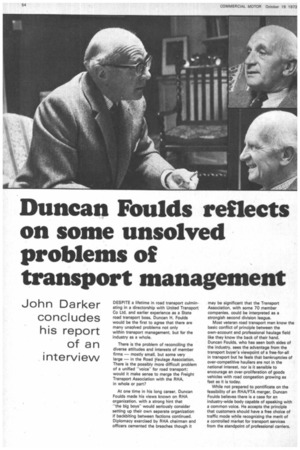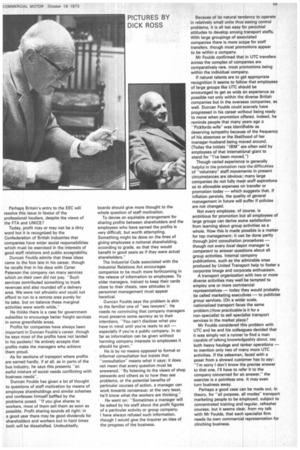John Darker concludes his report of an interview
Page 56

Page 57

If you've noticed an error in this article please click here to report it so we can fix it.
DESPITE a lifetime in road transport culminating in a directorship with United Transport Co Ltd, and earlier experience as a State road transport boss, Duncan H. Foulds would be the first to agree that there are many unsolved problems not only within transport management, but for the industry as a whole.
There is the problem of reconciling the diverse attitudes and interests of member firms — mostly small, but some very large — in the Road i-laulage Association. There is the possibly more difficult problem of a unified "voice" for road transport: would it make sense to merge the Freight Transport Association with the R HA, in whole or part?
At one time in his long career, Duncan Foulds made his views known on RHA organization, with a strong hint that "the big boys" would seriously consider setting up their own separate organization if backbiting between factions continued. Diplomacy exercised by R HA chairman and officers cemented the breaches though it may be significant that the Transport Association, with some 70 member companies, could be interpreted as a strongish second division league.
Most veteran road transport men know the basic conflict of principle between the own-account and professional haulage field like they know the back of their hand. Duncan Foulds, who has seen both sides of the industry, sees the advantage from the transport buyer's viewpoint of a free-for-all in transport but he feels that bankruptcies of over-competitive hauliers are not in the national interest, nor is it sensible to encourage an over-proliferation of goods vehicles with road congestion growing as fast as it is today.
While not prepared to pontificate on the feasibility of an R HA/FTA merger, Duncan Foulds believes there is a case for an industry-wide body capable of speaking with a common voice. He accepts the principle that customers should have a free choice of traffic mode while recognizing the merit of a controlled market for transport services from the standpoint of professional carriers. Perhaps Britain's entry to the EEC will resolve this issue in favour of the professional hauliers, despite the views of the FTA and UNICE?
Today, profit may or may not be a dirty word but it is recognized by the Confederation of British Industries that companies have wider social responsibilities which must be exercised in the interests of good staff relations and public acceptability.
Duncan Foulds admits that these ideas came to the fore late in his career, though he recalls that in his days with Carter Paterson the company ran many services which on their own did not pay. "Such services contributed something to trunk revenues and also rounded off a delivery area. We were not altruistic and could not afford to run to a remote area purely for its sake, but on balance these marginal activities were worth while."
He thinks there is a case for government subsidies to encourage better freight services in some greenfields areas.
Profits for companies have always been important in Duncan Foulds's career. though he says most of the profits have not landed in his pockets! He entirely accepts that profits make the managers who achieve them proud.
As for sections of transport where profits are earned hardly, if at all, as in parts of the bus industry, he says this presents "an awful mixture of social needs conflicting with business needs".
Duncan Foulds has given a lot of thought to questions of staff motivation by means of employee shareholdings and similar schemes and confesses himself baffled by the problems posed. "If you give shares to workers, most of them sell them as soon as possible. Profit sharing sounds all right; in a good year there may be good dividends for shareholders and workers but in hard times both will be dissatisfied. Undoubtedly, boards should give more thought to the whole question of staff motivation.
To devise an equitable arrangement for sharing profits between shareholders and the employees who have earned the profits is very difficult, but worth attempting. Something might be done on the lines of giving employees a notional shareholding. according to grade, so that they would benefit in good years as if they were actual shareholders."
The Industrial Code associated with the Industrial Relations Act encourages companies to be much more forthcoming in the release of information to employees. To older managers, trained to keep their cards close to their chests, new attitudes in personnel management must appear heretical.
Duncan Foulds says the problem is akin to the familiar one of "sea lawyers". He needs no convincing that company managers must preserve some secrecy as to their intentions. -You can't disclose what you have in mind until you're ready to act — especially if you're a public company. In so far as information can be given without harming company interests to employees it should be given.
He is by no means opposed to formal or informal consultation but insists that "consultation" means what it says; it does not mean that every question must be answered. -By listening to the views of shop stewards and others as to how they see problems. or the potential benefits of particular courses of action, a manager can work towards consensus: at the very least, he'll know what the workers are thinking."
He went on: "Sometimes a manager will be asked by his staff about the profit figures of a particular activity or group company.
have always refused such information, though I would give the inquirer an idea of the progress of the business. Because of its natural tendency to operate in relatively small units thus easing control problems, it is all too easy for parochial attitudes to develop among transport staffs. With large groupings of associated companies there is more scope for staff transfers, though most promotions appear to be within a company.
Mr Foulds confirmed that in UTC transfers across the complex of companies are comparatively rare, most promotions being within the individual company.
If natural talents are to get appropriate recognition it seems to follow that employees of large groups like UTC should be encouraged to get as wide an experience as possible not only within the diverse British companies but in the overseas companies, as well. Duncan Foulds could scarcely have progressed in his career without being ready to move when promotion offered. Indeed, he reminds people that many years ago a "Pickfords wife" was identifiable as deserving sympathy because of the frequency of his absences or the likelihood of her manager-husband being moved around. (Today the initials "IBM" are often said by employees of that international giant to stand for "I've been moved.") Though varied experience is generally helpful in the promotion race the difficulties of "voluntary" staff movements in present circumstances are obvious; many large companies do not fully meet staff aspirations as to allowable expenses on transfer or promotion today — which suggests that, if inflation persists, the quality of general management in future will suffer if policies are not changed.
Not every employee, of course, is ambitious for promotion but all employees of large groups can derive some satisfaction from learning about group activities as a whole. How this is made possible is a matter for top management; it can be done partly through joint consultation procedures — though not every local depot manager is competent to answer questions about all group activities. Internal cornpany publications, such as the admirable ones produced by United Transport help to foster a corporate image and corporate enthusiasm.
A transport organization with two or more diverse activities may well be tempted to employ one or more commercial representatives — today they would probably be called marketing executives — to publicise group services. (On a wider scale, nationalized transport faces the same problem.l How practicable is it for a non-specialist to sell specialist transport services in the market place?
Mr Foulds considered this problem with UTC and he and his colleagues decided that it was simply not a runner to find a man capable of talking knowledgeably about, say both heavy haulage and tanker operations — to mention only two of many more UTC activities. If the salesman, faced with a poser from a shrewd customer has to say: "I'm sorry I don't know the precise answer to that one, I'll have to refer it to the company concerned for an answer," the exercise is a pointless one. It may even turn business away.
Perhaps a good case can be made out, in theory. for "all purpose, all modes" transport marketing people to be employed, subject to concentrated training and regular, refresher courses, but it seems clear, from my talk with Mr Foulds, that each specialist firm needs its own commercial representation for clinching business.








































































































